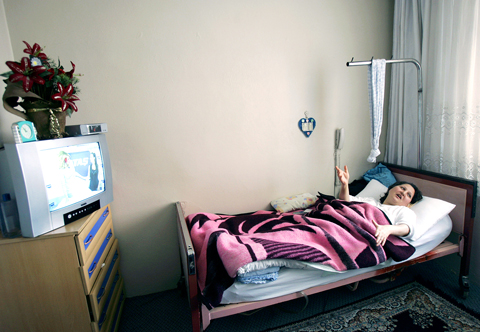Emine Yaman lies in bed, her legs rigid, her feet prone to sores and swelling. Paralyzed by a bullet her husband fired into her chest, she is the face of domestic violence in a country still struggling to discard long-held cultural practices that denigrate women.
She wears diapers and reaches for a knotted sheet hanging from an overhead bar to shift her upper body. The weak bones in her 40-year-old hips, knees and left arm have broken since the shooting in 1999. Infections induce fevers and she takes antibiotics. A municipal doctor sometimes visits her bare apartment beside a highway in Turkey’s biggest city.
Virtually abandoned by her family, she lives on the kindness of strangers.

PHOTO: AP
Her husband, Ahmet, who did a short stint in jail for shooting her, has filed for divorce, saying she was aggressive. He lives with their teen-age son and daughter in his home province of Giresun on the Black Sea coast.
DIVORCE?
Emine rarely talks to her children, and gets some consolation from refusing to divorce.
“He left me like this,” she said. “Should I divorce him and make him feel comfortable?”
Turkish media and activists have cited Emine Yaman’s story as an extreme example of the consequences of domestic violence in the secular state of more than 70 million people, mostly Muslims. The recent murder of an Italian peace activist hitchhiking in a wedding gown renewed debate about the problem. A man was charged with the killing.
Turkey is still grappling with the issue of violence against women in a largely patriarchal society where the old expressions go: “A beating comes from paradise” and “Don’t keep her without a stick on her back and a baby in her belly.” So tolerable is abuse that in the 1990s, a TV comedy show featured a character who was constantly beaten up by her husband.
Last year, a Turkish survey of 1,800 married women found that one in three was a victim of domestic abuse. Some global estimates are similar.
Turkey has struggled to curb “honor killings,” murders of women deemed to have tarnished the reputation of their relatives, sometimes by having a premarital affair or a child out of wedlock.
DISCRIMINATORY LAWS
Pressed by women’s groups and the EU, which the country hopes to join, Turkey removed many discriminatory laws, made rape within marriage a crime and barred sexual harassment in the workplace in a 2005 penal code. Activists say enforcement is weak and police and judges need training.
Turkey is also educating thousands of police about domestic abuse with tutors and training videos and backed an awareness campaign on television.
Some women’s activists support the Islamic-oriented government’s efforts to lift curbs on the wearing of Muslim head scarves, which would make it easier for pious women to get state jobs and education. But they say authorities should devote as much time to domestic violence.
Turkish law requires municipalities of more than 50,000 people to open shelters for women, but many cities don’t provide such help. Traditionally, authorities discourage breakups and urge couples to resolve differences, a path that can prolong the abuse.

Indonesia was to sign an agreement to repatriate two British nationals, including a grandmother languishing on death row for drug-related crimes, an Indonesian government source said yesterday. “The practical arrangement will be signed today. The transfer will be done immediately after the technical side of the transfer is agreed,” the source said, identifying Lindsay Sandiford and 35-year-old Shahab Shahabadi as the people being transferred. Sandiford, a grandmother, was sentenced to death on the island of Bali in 2013 after she was convicted of trafficking drugs. Customs officers found cocaine worth an estimated US$2.14 million hidden in a false bottom in Sandiford’s suitcase when

CAUSE UNKNOWN: Weather and runway conditions were suitable for flight operations at the time of the accident, and no distress signal was sent, authorities said A cargo aircraft skidded off the runway into the sea at Hong Kong International Airport early yesterday, killing two ground crew in a patrol car, in one of the worst accidents in the airport’s 27-year history. The incident occurred at about 3:50am, when the plane is suspected to have lost control upon landing, veering off the runway and crashing through a fence, the Airport Authority Hong Kong said. The jet hit a security patrol car on the perimeter road outside the runway zone, which then fell into the water, it said in a statement. The four crew members on the plane, which

Japan’s ruling Liberal Democratic Party (LDP) and its junior partner yesterday signed a coalition deal, paving the way for Sanae Takaichi to become the nation’s first female prime minister. The 11th-hour agreement with the Japan Innovation Party (JIP) came just a day before the lower house was due to vote on Takaichi’s appointment as the fifth prime minister in as many years. If she wins, she will take office the same day. “I’m very much looking forward to working with you on efforts to make Japan’s economy stronger, and to reshape Japan as a country that can be responsible for future generations,”

SEVEN-MINUTE HEIST: The masked thieves stole nine pieces of 19th-century jewelry, including a crown, which they dropped and damaged as they made their escape The hunt was on yesterday for the band of thieves who stole eight priceless royal pieces of jewelry from the Louvre Museum in the heart of Paris in broad daylight. Officials said a team of 60 investigators was working on the theory that the raid was planned and executed by an organized crime group. The heist reignited a row over a lack of security in France’s museums, with French Minister of Justice yesterday admitting to security flaws in protecting the Louvre. “What is certain is that we have failed, since people were able to park a furniture hoist in the middle of